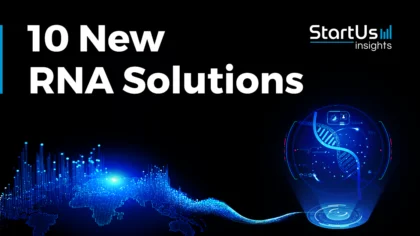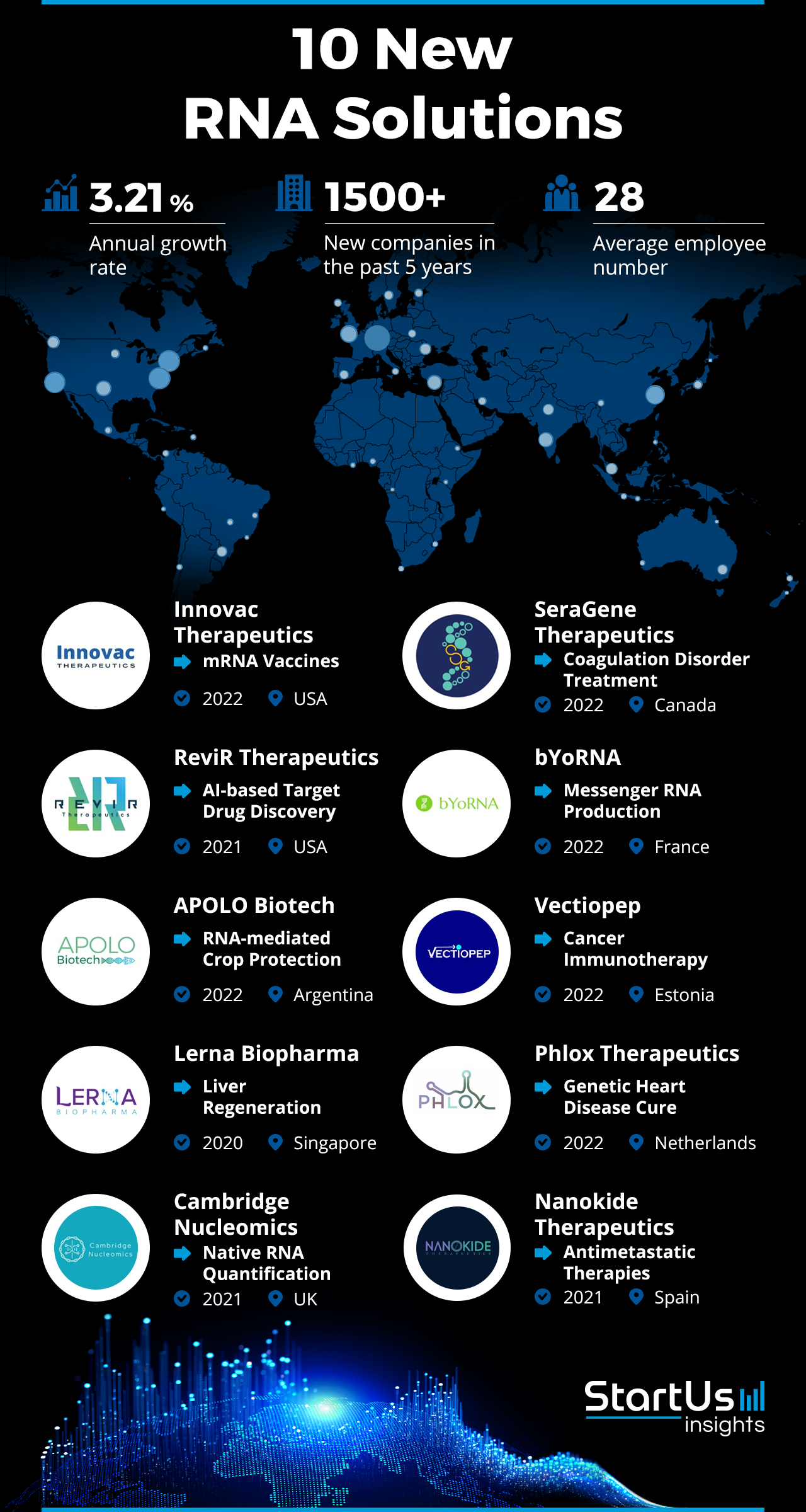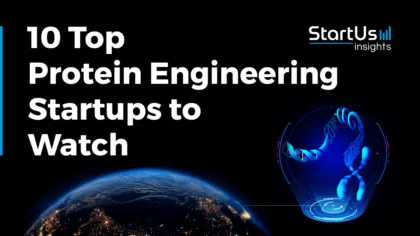Accelerate Productivity in 2025
Reignite Growth Despite the Global Slowdown
This article provides an analytical overview of 10 new RNA solutions and the latest advancements in RNA-based technologies. These technologies encompass mRNA vaccines that address infectious diseases, RNA interference (RNAi) for gene silencing, and CRISPR-Cas systems for precise gene editing. Additionally, delivery mechanisms such as lipid nanoparticles (LNPs) and viral vectors enhance the stability and specificity of RNA therapeutics. Each highlighted technology tackles specific challenges in the sector, including delivery efficiency and targeted specificity. The article showcases the dynamic and expanding impact of RNA-based innovations across medical and scientific domains. The last update of this report was 5 days ago. If you spot incomplete or incorrect info, please let us know.
Continue reading to gain up-to-date and data-driven insights on:
Key Takeaways
Drawing insights from the Big Data & AI-powered StartUs Insights Discovery Platform that provides data on over 4.7+ million emerging companies globally, we explore the evolving landscape of the RNA tech domain. This sector is marked by key trends and a substantial workforce, shaping its future. Here are some key insights at a glance:
- Latest RNA Tech Trends: The latest RNA trends include small interfering RNA (siRNA), long non-coding RNA (lncRNA), circular RNA (circRNA), CRISPR-based RNA editing, and single-cell RNA sequencing.
- RNA Market Statistics: The global RNA domain encompasses 9.6K+ organizations and has a workforce of 101.8K people. It is experiencing a 3.21% annual growth rate and has seen the emergence of 1.5K+ new RNA companies in the past five years. Each of these companies employs about 28 people.
- 10 New RNA Companies to Watch:
- Innovac Therapeutics – mRNA Vaccines
- ReviR Therapeutics – AI-based Target Drug Discovery
- APOLO Biotech – RNA-mediated Crop Protection
- Lerna Biopharma – Liver Regeneration
- Cambridge Nucleomics – Native RNA Quantification
- SeraGene Therapeutics – Coagulation Disorder Treatment
- bYoRNA – Messenger RNA Production
- Vectiopep – Cancer Immunotherapy
- Phlox Therapeutics – Genetic Heart Disease Cure
- Nanokide Therapeutics – Antimetastatic Therapies
Discover 10 out of 1.5K+ Emerging RNA Solutions
In this section, we highlight 10 emerging RNA solutions that address critical challenges in drug delivery, genetic therapies, and disease diagnostics. By leveraging advanced molecular biology techniques, delivery systems, and therapeutic applications, each company advances different fields including medicine, agriculture, biotechnology, and environmental science.
Note on Signal Strength
One of the unique metrics we feature for each company is Signal Strength, a proprietary data point generated by our Discovery Platform. It gauges the extent to which a company’s influence has permeated the global ecosystem of startups, scaleups, and emerging companies. This proprietary metric serves as a valuable guidepost for understanding a company’s standing in the broader market landscape.
1. Innovac Therapeutics
- Founding Year: 2022
- Employee Range: 11-50
- Location: USA
- Signal Strength: Very Strong
- What they do: Innovac Therapeutics develops a proprietary RNA technology to create vaccines. The company’s mRNA design platform employs computational algorithms for optimizing codon usage, secondary structures, and untranslated regions (UTRs) to enhance translation efficiency and stability. The delivery system platform utilizes lipid nanoparticle (LNP) encapsulation to ensure messenger RNA (mRNA) protection, effective membrane translocation, and favorable immune response induction. Additionally, the computational platform designs universal T-cell epitope vaccines to promote cytotoxic T-cell (CD8+) and helper T-cell (CD4+) responses against diseases.
2. ReviR Therapeutics
- Founding Year: 2021
- Employee Range: 11-50
- Location: USA
- Signal Strength: Very Strong
- What they do: ReviR Therapeutics builds VoyageR, a discovery engine with RNA-modifying small molecules that target Huntington’s disease and other neurogenetic disorders. The engine utilizes AI to design a diverse RNA-targeting compound library specifically for splicing. It performs transcriptome-wide compound screening with multiplex and high-throughput RNA technologies. VoyageR’s AI system rapidly discovers targets and identifies promising lead compounds using in-silico methods. Further, the integrated web application provides feedback, accelerates the discovery, and develops treatments while optimizing resource use and assisting neurogenetic disease patients.
3. APOLO Biotech
- Founding Year: 2022
- Employee Range: 11-50
- Location: Argentina
- Signal Strength: Strong
- What they do: APOLO Biotech offers an RNA-based, GMO-free technology to boost agricultural productivity while preserving local landrace diversity. The company implements exogenous RNA-mediated crop protection via spray-induced gene silencing (SIGS) to enhance plant resilience. Nanoparticle-mediated delivery systems protect double-stranded RNA (dsRNA) or small interfering RNA (siRNA) against environmental degradation factors like UV light and pH. These dsRNAs get absorbed into epidermal cells and move through vascular bundles to reach distal parts of the plant and target pathogens to trigger the RNAi response. In the plant cytoplasm, endogenous RNAi machinery processes dsRNAs into active siRNAs, which degrades specific transcripts to protect against viral attacks. Additionally, chemical modifications stabilize RNA and enhance protection from pH variations and degradation, especially in insects.
4. Lerna Biopharma
- Founding Year: 2020
- Employee Range: 11-50
- Location: Singapore
- Signal Strength: Very Strong
- What they do: Lerna Biopharma provides nucleic acid therapeutics for liver regeneration. The company’s proprietary GalNAc platform targets and delivers siRNA to liver hepatocytes. This silences genes that contribute to liver fibrosis. Its lead asset, LR1, sustains and improves liver functions in cirrhotic patients by promoting hepatocyte regeneration and protecting the liver from further deterioration. This approach addresses a critical gap in liver disease treatment and reduces the need for liver transplants.
5. Cambridge Nucleomics
- Founding Year: 2021
- Employee Range: 2-10
- Location: UK
- Signal Strength: Very Strong
- What they do: Cambridge Nucleomics creates a nanostructure design technology that customizes molecular probes to detect specific nucleic acid molecules natively. This technology digitizes specific signals from RNA samples using a single-molecule readout technique, ensuring direct, accurate, and high-multiplexed measurements without complicated processing. The platform also applies to other biomolecules like DNA while RNA quantification aids drug discovery for diagnostics and prognosis of diseases such as cancers.
6. SeraGene Therapeutics
- Founding Year: 2022
- Employee Range: 2-10
- Location: Canada
- Signal Strength: Medium
- What they do: SeraGene Therapeutics develops RNA and nanomedicine technologies to treat coagulation disorders. The company’s proprietary RNA agents, combined with liver-targeting drug delivery vehicles, modulate clotting protein expression to restore hemostasis. It encapsulates RNA sequences in lipid nanoparticles (LNP) to ensure effective delivery and localization to the liver upon injection. Moreover, SeraGene Therapeutics corrects complex drivers of coagulation to enhance therapeutic outcomes for rare bleeding and thrombotic disorders. The company focuses on prophylactic therapies and improves transfusable platelet stability for inherited or acquired platelet dysfunction.
7. bYoRNA
- Founding Year: 2022
- Employee Range: 2-10
- Location: France
- Signal Strength: Very Strong
- What they do: bYoRNA makes RNA-based bioproduction technology using eukaryotic cell biofactories to create high-quality mRNA. Its approach isolates therapeutic mRNA within cell subcompartments to prevent degradation and enable large-scale production. The master cell bank optimizes mRNA expression using proprietary recombinant cell platforms, followed by an upstream process that accumulates mRNA inside cell subparts. This technology lowers production costs compared to traditional cell-free systems and enhances accessibility for patients globally. The platform provides effective RNA-based therapies for patients with infectious diseases, cancer, and rare genetic disorders.
8. Vectiopep
- Founding Year: 2022
- Employee Range: 2-10
- Location: Estonia
- Signal Strength: Strong
- What they do: Vectiopep builds a tissue-specific RNA delivery system to enhance cancer immunotherapy by selectively activating the patient’s innate immune system. The company’s proprietary technology uses cell-penetrating peptides (CPP) to transport mRNA into immune cells with high precision. This technology activates antigen-presenting cells, such as dendritic cells, to activate killer T cells and destroy cancer cells. Vectiopep’s RNA nanoparticles protect mRNA from degradation and ensure delivery primarily to lymphoid tissues and targeting the spleen. This system protects patients with cancer recurrence through immune system activation.
9. Phlox Therapeutics
- Founding Year: 2022
- Employee Range: 2-10
- Location: Netherlands
- Signal Strength: Very Strong
- What they do: Phlox Therapeutics creates gene therapies to cure genetic heart diseases using RNA technology. The company’s platform targets therapy-resistant heart failure and cardiac laminopathies by targeting multiple Lamin gene mutations and providing personalized treatments for cardiomyopathy. Phlox Therapeutics’ PHL-001, the RNA-based therapeutic, selectively activates cardiomyocytes and modulates harmful gene expression. This approach assists patients with severe heart conditions.
10. Nanokide Therapeutics
- Founding Year: 2021
- Employee Range: 2-10
- Location: Spain
- Signal Strength: Medium Strong
- What they do: Nanokide Therapeutics provides an antimetastatic solution combining nanotechnology and RNA-based therapies. The solution integrates a flexible sorbitan ester-based nanosystem with microRNA and mRNA sequences to combat cancer. This non-toxic nanosystem adapts to various anticancer drug formulations. Its application involves miR-20a, a small non-coding RNA, to downregulate liver sinusoidal endothelial cells during liver metastasis. Nanoparticles loaded with miR-20a and decorated with chondroitin sulfate deliver the RNA to these cells by inhibiting angiogenesis. This approach enhances the effectiveness of anticancer therapies by restoring missing miR-20a and preventing tumor growth.
Quick Tip to Find New RNA Solutions
Utilizing a SaaS platform like the Discovery Platform for identifying new RNA solutions provides significant benefits compared to traditional scouting methods:
- Increased Efficiency: The Discovery Platform offers advanced tools that streamline the scouting process. It replaces your hours of conventional desk research, saving time and resources in identifying RNA-based innovations.
- Access to Real-time Insights: Gain a competitive edge with up-to-date information on the latest trends in the RNA technology domain. The platform keeps you informed with near real-time updates on emerging RNA solutions and news, enabling you to make swift and informed decisions.
- Tailored Exploration: Customize your search to focus on specific niches within the RNA tech domain, such as antimetastatic therapies, genetic heart diseases cure, or cancer immunotherapy. The platform’s diverse filtering options allow you to target your scouting efforts precisely, ensuring that you find the most relevant and groundbreaking companies in the field.
Ready to Explore All New RNA Solutions?
We’ve explored the dynamic landscape of the RNA technology domain, examining the latest trends and spotlighting exceptional companies driving innovation. To dive deeper, download our free BioTech Report or schedule a demo of the Discovery Platform for a customized exploration of these groundbreaking developments. We value collaboration with industry professionals to offer even better insights. Interested in contributing? Get in touch!









